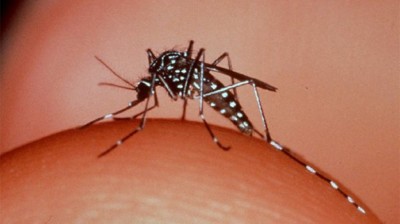
Mosquitoes, especially this summer, are serious business.
They are not only a nuisance; they can also carry and a variety of spread serious diseases to humans and pets.
Today’s concern about transmission of the Zika virus primarily transmitted by the Aedes mosquitoes.
The Asian Tiger Mosquito, an invasive pest from Asia, has become more of a problem in the last few years and behaves differently from native mosquitoes. Tigers have a short flight range, about 100-200 yards. If you feel them biting you, then they are breeding nearby.
Homeowners can greatly reduce an infestation.
They have strong preference for breeding in small, man-made containers you probably don’t even think about. They are looking for any small, water-holding containers on YOUR property.
Walk around your house, patio, garage, etc. and look carefully for anything that retains water – even just a little bit of water. If you find any, dump the water and either throw the item away or store it in or under something that does not collect water.
Tiger mosquitoes tend to remain at ground level, especially under ground covers such as English Ivy. Other favorite spots are under decks and shrubs, and crawl spaces.
Mosquitoes prefer containers with stagnant water (not fresh) that have accumulated sediment and organic matter. Empty all potential nesting places on your property such as:
• Children’s toys, especially plastic toys that have small areas where water can pool. Keep in mind that the toy itself may be very big, like a bike or a play house, but if it has handles or any indentation where water can pool in small amounts, it’s a breeding ground. MDA inspectors have also found that portable basketball stands are a big culprit as well.
• All containers, such as buckets, pails, water bottles, trash cans (including lids), storage totes, recycling containers, etc. Even if these items are kept upside down, water can often pool in the handles or lips of the container.
• Tarps that hold water, even just a little.
• Tires not on cars that are collecting water.
• Plastic chairs, tables and all outside furniture, especially if it is upside down
• Flower pots, especially those with a saucer underneath it to catch water.
• Wheel barrels stored improperly.
• Anything that can hold small amounts of water. Even large things that hold water, like bird baths, usually have calm areas around the edges where mosquitoes can breed.
Protecting yourself from bites
DEET is considered the ‘gold standard’ of mosquito repellents. Endorsed by the Centers for Disease Control (CDC), DEET doesn’t mask the smell of the host or jam the insect’s senses – mosquitoes simply don’t like it because it smells bad to them. A product containing 10 percent DEET can protect you for up to 90 minutes. Two other repellents, picaridin and lemon-eucalyptus oil, have also proven effective and are now recommended by the CDC.
Don’t waste your money on ultrasonic devices – At least 10 studies in the past 15 years have unanimously denounced ultrasonic devices as having no repellency value whatsoever.
Interesting Facts
- Female mosquitoes lifespan is about 2-3 weeks
- Male mosquitoes lifespan is about 10 days
- They have limited flight ranges of about 300 feet
- They are mostly attracted to carbon dioxide and are drawn to it up to 115 feet
- Dark clothing attracts mosquitoes
- Only female mosquitoes bite
